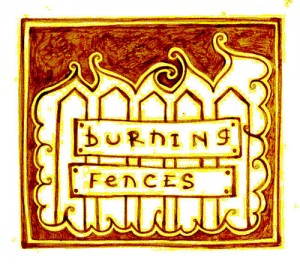
Neither Lauds nor Vespers is to end without the Lord’s Prayer, said aloud by the superior, in a voice all may hear because of the thorns of scandal always springing – so the brothers, remembering their pledge in the prayer: “Forgive us our trespasses, as we forgive those who trespass against us,” may purge themselves.
Why are we different?
After some continued emphasis on the use of psalms St. Benedict ends this chapter with a particularly clever device to ensure no member of the community forgets how community is truly built; forgiveness.
I’ve been reading this chapter during a week of extremely heightened emotions with various friends and family speaking on the contentious issue of same-sex marriage. Whatever anyone thinks on this matter we can all agree that it taps into a deep part of all our identities; if we are for the change in law then it brings out deeply held emotions for friends and family members and our understanding of happiness, justice and love. The same is true if we are against the change. It is a complicated issue, as the Archbishop helpfully highlighted on Saturday in Bury St Edmunds.
The difficult thing has been to be a part of a community, locally and on social media, where people are free to express their deeply held beliefs, which stem from deep seated conditioning, and create conflict, cutting others of different views. It is impossible not to state one’s view without upsetting or dividing from those that believe something different. We are all, at this point in time, acutely aware of all our difference. Is the solution, however, just to forget or minimise them and attempt to express similarities?
I have quoted John Milbank and Stanley Hauerwas many times in my blog and I return to a thought explored in Hauerwas’ book ‘Performing the Faith: Bonhoeffer and the Practice of Nonviolence’. Here Hauerwas uses Milbank’s reflections on the Christian understanding of God as Trinitarian, difference united.
The fact that Christianity has always understood God as the God “who is also difference, who includes relation, and manifold expression” means that any conception of God as monistic is proscribed. (Stanley Hauerwas, “Performing the Faith: Bonhoeffer and the Practice of Nonviolence” (London: SPCK, 2004) p.87, quoting John Milbank, “The Second Difference: For Trinitarianism without Reserve”, Modern Theology 2/3 (April 1986) p. 213)
Here we look to God who alone holds difference in peace. This activity is bound up in the eternal mystery of the reality of the Trinity and we do God a great disservice to speak of such incomprehensible truth in simplistic terms, as if we can understand and rationally and intellectually copy His Being. The truth is, however much we speak of tolerance and acceptance of difference, we do not live this out.
Difference “enters the existing common cultural space only to compete, displace or expel”; “in the public theatre, differences arise only to fall; each new difference has a limitless ambition to obliterate all others, and therefore to cancel out difference itself.” The best a secular peace can hope for, then, is a “tolerable” regulation or management of conflict by one coercive means or another. (Hauerwas, “Performing the Faith”, p. 88, quoting Milbank, “Theology and Social Theory: Beyond Secular Reason (Oxford: Basil Blackwell, 1990) p. 290)
In the current issue of same sex marriage, I have been acutely aware of how we, as a society, have discussed (or not) and have spoken of difference. Despite a large amount said on ‘equality’, ‘respect’, ‘acceptance’, little has been demonstrated by both sides (me included). Equality has become ‘sameness’. Respect has become ‘live and let live’. Acceptance has become ‘permissiveness’. These values which we apparently share cannot be shared for the root and understanding of the terms are different. Let us not ignore that fact. Difference, if it is to be held, must also be acknowledged and held in the light. I said, early on in this process, that if we do not pay close attention to the how of the process then the deeper whats will remain unchanged. Yes we have same sex marriage but what is the cost? The church divided from society, people who are against are now ghettoised until they accept the status quo. If they do not then they are labelled ‘evil’, ‘unloving’, ‘bigots’. They are forced, through fear of being isolated from society, into giving up their views as wrong. The response for those for the change?
They will soon learn how backwards they are.
We will all look back on this and be shocked it took so long.
We have progressed. Have we progressed well, though? In all of this conflict, pain and suffering, division and vitriol, I’ve been meditating on these words from St. Benedict,
Neither Lauds nor Vespers is to end without the Lord’s Prayer, said aloud by the superior, in a voice all may hear because of the thorns of scandal always springing – so the brothers, remembering their pledge in the prayer: “Forgive us our trespasses, as we forgive those who trespass against us,” may purge themselves.
Forgiveness begins with an open generosity to be willing to admit we are mistaken, even on issues of our own identity and sexuality. I understand my friends who are gay because I understand the complexity I have wrestled with in my own sexuality. Even as a heterosexual I am aware of my teenage life being confused with same-sex attraction. There was several boys in my school who I felt attracted to. Being from a liberal home and participating the arts which encouraged freedom of exploration and expression I was comfortable with the feelings I felt. In the end I decided to be heterosexual. I am more than aware of the more difficult and painful experiences of others and I am in no way trying to belittle those experiences all I’m attempting to do is to state my appreciation of difference, conditioning and complexity of how life shapes us through genetics, parenting and social norms.
From this point of acknowledging my unknowing I am able to enter into a knowing. Humility is that portal into which we step towards real community. Alongside humility is obedience; that call to, while waiting for clarity, to practice the art of life. I am wary, and have been for some time, the way in which a society now considers time. There is a fear that patience is seen as weakness and cowardice. There is the call to ‘make a decision’, ‘to act now’ which destroys any sense of the need for wisdom which only comes over time. I feel this pressure and the question it raises of integrity but obedience holds us, mostly in liturgical expressions, to try and move beyond the instinctive response, which we cannot tell whether they are good or bad or whether they will be constructive or destructive.
Being disciplined in obedience is perhaps the key virtue of a good and faithful performer. This is a skill that can be acquired only in communities that foster an ‘ecology of hope,” what Nicholas Lash calls “schools of stillness, of attentiveness; of courtesy, respect and reverence; academies of contemplatively.” (Hauerwas, “Performing the Faith”, p.100, quoting Nicholas Lash, “The Church in the State We’re In”, Modern theology 13/1 (January 1997) p.131)
Hauerwas goes on to say,
…the patience of a good performer requires a doing but also and equally important a suffering, an undergoing, a giving up, a receptivity, a capitulation. This giving up, however, is more a giving over or dispossession of oneself in the performance rather than a concession to fatalism… This ability to let go of oneself, to dispossess oneself in the very execution of the act, is a skill that is not learned quickly or easily and certainly not on one’s own. Indeed, if acquired at all, it is learned in communion and fellowship with others over the course of an entire Christian life. (Hauerwas, “Performing the Faith”, p.100-101)
This painful suffering of ‘ekstasis’ (the giving up of oneself) is to be done in a community where we are encouraged to do so. Many of you, dear readers, will immediately name one group who should learn to do this ‘giving up’ but there is our problem; we expect one group to without the other needing to. Those that are ‘wrong’ must learn to loosen their oppression of the other but which side is wrong? The traditionalists or the liberal progressives? True community is entering, together into the unknowing of human life and truth and giving up of ourselves, patiently bearing with one another in love AND truth.
This can only be practiced within a community which holds to an ‘ecology of hope’. Hope, in our current context, I would propose, has been replaced with Wish-fulfillment. Wish-fulfillment demands a particular action, a certain event to happen or object to be given. Hope, in contrast, is based not on specifics but on a trust to something beyond ourselves. For Christians this Hope is set in God and Jesus Christ. I have wishes that things turn out my way but I hope in God.
How then do we proceed in a society where there is no shared authority? I wish to have an intentional engagement with virtues; a teaching and sharing of ideas in a public setting. This is not going to happen and so I hope in God who holds and creates difference from His singular source of Divine Love which far surpasses our paltry imitations of the emotion. We, in community, must fall on our knees in silence and live and act in patience for wisdom and revelation.
…performance that is truly improvisatory requires the kind of attentiveness, attunement, and alertness traditionally associated with contemplative prayer. (Hauerwas, “Performing the Faith”, p.81)
Reflection
St. Benedict knows the difficulty of living in community and so, even amidst the prosaic outlining of liturgical practice he reminds the members of the need for humility (‘Forgive us our trespasses’) and the painful suffering of obedience to a source outside of ourselves (‘as we forgive those who trespass against us’) In the parish context, we are part of a manageable group of people, linked, via the representatives (priests and bishops), to the global Church and to the neighbourhoods in which we live. In this more manageable community we should be working out how Salvation in Time through patient contemplation and action which stems from it. We must learn how to give one another space to be transformed and set free from our own perceptions of self, identities and sexualities (hetero, homo, bi, whatever).
Generous, Forgiving, Loving God, how far we fall from Your will and Your providence. How little we truly experience of Your Hope and rhythm of Time. Guide me, Your humble servant into Your presence to be shaped into the likeness of Your Son, who gave Himself up that I may know You and Your strength to save.
Come, Lord Jesus.
 I have had the privilege of being welcomed into a community over the last year which has had an ongoing and deeply transformative impact on me and my vocation as an ordained priest. The community are mainly in their twenties and would, at a cursory glance, be classified as ‘arty’ intellectual types, although this is not entirely true; not that they are not either of those things but that which unites this group isn’t those two general categories. It is only in the last month or so that I have begun to grasp the ‘charism’, the ‘je ne sais qua’, of Burning Fences.
I have had the privilege of being welcomed into a community over the last year which has had an ongoing and deeply transformative impact on me and my vocation as an ordained priest. The community are mainly in their twenties and would, at a cursory glance, be classified as ‘arty’ intellectual types, although this is not entirely true; not that they are not either of those things but that which unites this group isn’t those two general categories. It is only in the last month or so that I have begun to grasp the ‘charism’, the ‘je ne sais qua’, of Burning Fences. Before I stumbled through the doors one cold December night, this community had been meeting, singing and telling stories for a year or more. They had produced a CD of songs which they had developed entitled ‘Of Anthem and Ashes’. The images that were resonating with them then and remain reverberating through our times together are phoenix like resurrections; songs sung in the rubble, new plants breaking through concrete. These images have always resonated with me and it’s why I know I am a ‘fence burner’.
Before I stumbled through the doors one cold December night, this community had been meeting, singing and telling stories for a year or more. They had produced a CD of songs which they had developed entitled ‘Of Anthem and Ashes’. The images that were resonating with them then and remain reverberating through our times together are phoenix like resurrections; songs sung in the rubble, new plants breaking through concrete. These images have always resonated with me and it’s why I know I am a ‘fence burner’. The times when Church is most frustrating, for me, is in the ‘necessary organization’. What irks me is the lack of convincing Biblical precedent. The Temple system failed and yet here we are in the 21st century rebuilding it. I get it, organic is messy and uncontrollable, unpredictable but it’s how the world functions. We human beings are devastating when we control and tinker with the organic creation. We’ve tried to organize the world and what we discover is we’re trapped in boxes which do not fit nor encourage us to flourish in the ways in which we should.
The times when Church is most frustrating, for me, is in the ‘necessary organization’. What irks me is the lack of convincing Biblical precedent. The Temple system failed and yet here we are in the 21st century rebuilding it. I get it, organic is messy and uncontrollable, unpredictable but it’s how the world functions. We human beings are devastating when we control and tinker with the organic creation. We’ve tried to organize the world and what we discover is we’re trapped in boxes which do not fit nor encourage us to flourish in the ways in which we should.


